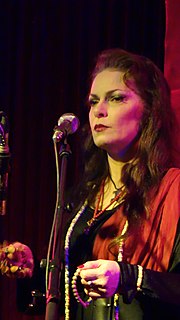A Quote by Heidi Julavits
I guess what I find so interesting about memory, and its role in a person's identity, is how the attempt to achieve accuracy requires you to remove yourself from your life in an authorial manner.
Related Quotes
See, I think our whole society is much too problem-solving oriented. It is far more interesting to participate in 'problem creation'... You know, ask yourself an interesting enough question and your attempt to find a tailor-made solution to that question will push you to a place where, pretty soon, you'll find yourself all by your lonesome - which I think is a more interesting place to be.
Spend the most time with your best people. ... Talent is the multiplier. THe more energy and attention you invest in it, the greater the yield. The time you spend with your best is, quite simply, your most productive time. ... Persistence directed primarily toward your non-talents is self-destructive. ... You will reprimand yourself, berate yourself, and put yourself through all manner of contortions in an attempt to achieve the impossible.
There is a stage you reach, Deagle thinks, a time somewhere in early middle age, when your past ceases to be about yourself. Your connection to your former life is like a dream or delirium, and that person who you once were is merely a fond acquaintance, or a beloved character from a storybook. This is how memory becomes nostalgia. They are two very different things - the same way that a person is different from a photograph of a person.
I'm not very eloquent about things like this, but I think that writing and photography go together. I don't mean that they are related arts, because they're not. But the person doing it, I think, learns from both things about accuracy of the eye, about observation, and about sympathy toward what is in front of you... It's about honesty, or truth telling, and a way to find it in yourself, how to need it and learn from it.
When your life is not in balance and you're struggling to achieve stability, practicing observation without judgment gets really interesting, and very useful. How? Because you can learn to distance yourself from the roller coaster ride of your emotions and circumstances but still enjoy the ride of life.
Have you ever said, 'I can't do that! I'm just not like that!'? If you've ever used this phrase, you've hit the boundary of how you've defined yourself in the past, and it's affecting the quality of your present-day life. Ask yourself, 'Where did these beliefs about who I am come from, and how old are they?' Maybe it's time to update your identity.
This is the best message that I have been responsibly for it. This will help you, A, find your identity. Because you can never overcome life issues. You'll never overcome your condition without knowing your position. So identity. Significance comes out of identity, meaning life's purpose, your why in life. But the great thing is this book ['You are all that'] is so practical.
Shapeshifting requires the ability to transcend your attachments, in particular your ego attachments to identity and who you are. If you can get over your attachment to labeling yourself and your cherishing of your identity, you can be virtually anybody. You can slip in and out of different shells, even different animal forms or deity forms.
I think you reveal yourself by what you choose to photograph, but I prefer photographs that tell more about the subject. There's nothing much interesting to tell about me; what's interesting is the person I'm photographing, and that's what I try to show. [...] I think each photographer has a point of view and a way of looking at the world... that has to do with your subject matter and how you choose to present it. What's interesting is letting people tell you about themselves in the picture.
Take a good look at your life right now. If you don't like something about it, close your eyes and imagine the life you want. Now allow yourself to focus your inner eye on the person you would be if you were living this preferred life. Notice the differences in how you behave and present yourself; allow yourself to spend several seconds breathing in the new image, expanding your energy into this.































